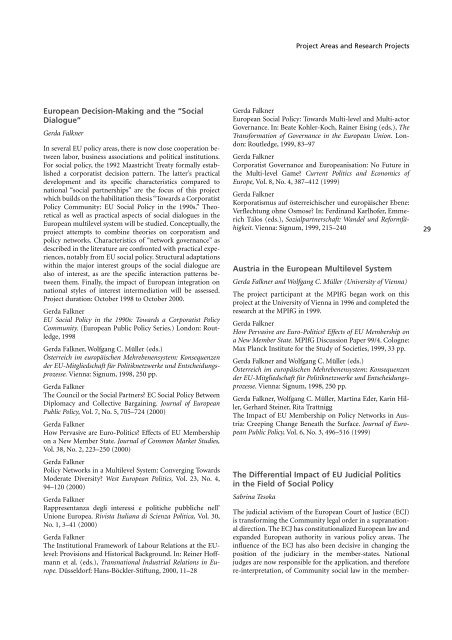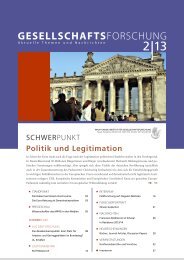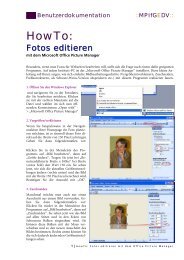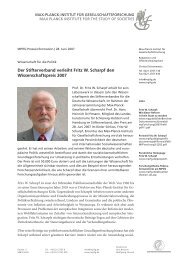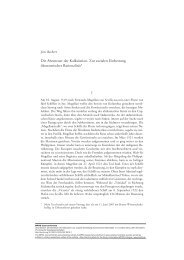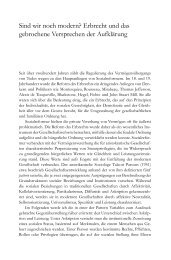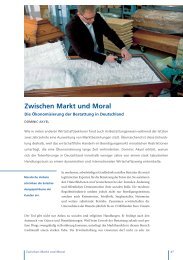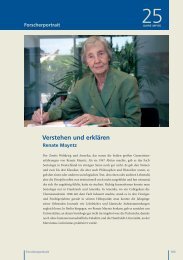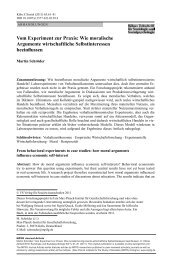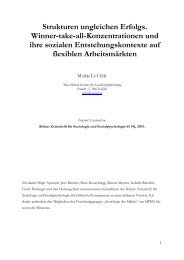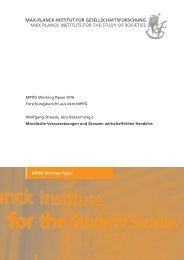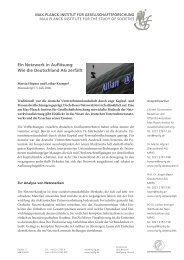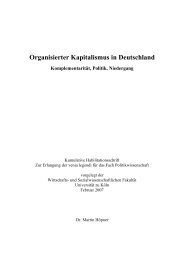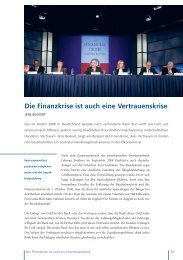Publications - MPIfG
Publications - MPIfG
Publications - MPIfG
Create successful ePaper yourself
Turn your PDF publications into a flip-book with our unique Google optimized e-Paper software.
European Decision-Making and the “Social<br />
Dialogue”<br />
Gerda Falkner<br />
In several EU policy areas, there is now close cooperation between<br />
labor, business associations and political institutions.<br />
For social policy, the 1992 Maastricht Treaty formally established<br />
a corporatist decision pattern. The latter’s practical<br />
development and its specific characteristics compared to<br />
national “social partnerships” are the focus of this project<br />
which builds on the habilitation thesis “Towards a Corporatist<br />
Policy Community: EU Social Policy in the 1990s.” Theoretical<br />
as well as practical aspects of social dialogues in the<br />
European multilevel system will be studied. Conceptually, the<br />
project attempts to combine theories on corporatism and<br />
policy networks. Characteristics of “network governance” as<br />
described in the literature are confronted with practical experiences,<br />
notably from EU social policy. Structural adaptations<br />
within the major interest groups of the social dialogue are<br />
also of interest, as are the specific interaction patterns between<br />
them. Finally, the impact of European integration on<br />
national styles of interest intermediation will be assessed.<br />
Project duration: October 1998 to October 2000.<br />
Gerda Falkner<br />
EU Social Policy in the 1990s: Towards a Corporatist Policy<br />
Community. (European Public Policy Series.) London: Routledge,<br />
1998<br />
Gerda Falkner, Wolfgang C. Müller (eds.)<br />
Österreich im europäischen Mehrebenensystem: Konsequenzen<br />
der EU-Mitgliedschaft für Politiknetzwerke und Entscheidungsprozesse.<br />
Vienna: Signum, 1998, 250 pp.<br />
Gerda Falkner<br />
The Council or the Social Partners? EC Social Policy Between<br />
Diplomacy and Collective Bargaining. Journal of European<br />
Public Policy, Vol. 7, No. 5, 705–724 (2000)<br />
Gerda Falkner<br />
How Pervasive are Euro-Politics? Effects of EU Membership<br />
on a New Member State. Journal of Common Market Studies,<br />
Vol. 38, No. 2, 223–250 (2000)<br />
Gerda Falkner<br />
Policy Networks in a Multilevel System: Converging Towards<br />
Moderate Diversity? West European Politics, Vol. 23, No. 4,<br />
94–120 (2000)<br />
Gerda Falkner<br />
Rappresentanza degli interessi e politiche pubbliche nell’<br />
Unione Europea. Rivista Italiana di Scienza Politica, Vol. 30,<br />
No. 1, 3–41 (2000)<br />
Gerda Falkner<br />
The Institutional Framework of Labour Relations at the EUlevel:<br />
Provisions and Historical Background. In: Reiner Hoffmann<br />
et al. (eds.), Transnational Industrial Relations in Europe.<br />
Düsseldorf: Hans-Böckler-Stiftung, 2000, 11–28<br />
Gerda Falkner<br />
European Social Policy: Towards Multi-level and Multi-actor<br />
Governance. In: Beate Kohler-Koch, Rainer Eising (eds.), The<br />
Transformation of Governance in the European Union. London:<br />
Routledge, 1999, 83–97<br />
Gerda Falkner<br />
Corporatist Governance and Europeanisation: No Future in<br />
the Multi-level Game? Current Politics and Economics of<br />
Europe, Vol. 8, No. 4, 387–412 (1999)<br />
Gerda Falkner<br />
Korporatismus auf österreichischer und europäischer Ebene:<br />
Verflechtung ohne Osmose? In: Ferdinand Karlhofer, Emmerich<br />
Tálos (eds.), Sozialpartnerschaft: Wandel und Reformfähigkeit.<br />
Vienna: Signum, 1999, 215–240<br />
Austria in the European Multilevel System<br />
Gerda Falkner and Wolfgang C. Müller (University of Vienna)<br />
The project participant at the <strong>MPIfG</strong> began work on this<br />
project at the University of Vienna in 1996 and completed the<br />
research at the <strong>MPIfG</strong> in 1999.<br />
Gerda Falkner<br />
How Pervasive are Euro-Politics? Effects of EU Membership on<br />
a New Member State. <strong>MPIfG</strong> Discussion Paper 99/4. Cologne:<br />
Max Planck Institute for the Study of Societies, 1999, 33 pp.<br />
Gerda Falkner and Wolfgang C. Müller (eds.)<br />
Österreich im europäischen Mehrebenensystem: Konsequenzen<br />
der EU-Mitgliedschaft für Politiknetzwerke und Entscheidungsprozesse.<br />
Vienna: Signum, 1998, 250 pp.<br />
Gerda Falkner, Wolfgang C. Müller, Martina Eder, Karin Hiller,<br />
Gerhard Steiner, Rita Trattnigg<br />
The Impact of EU Membership on Policy Networks in Austria:<br />
Creeping Change Beneath the Surface. Journal of European<br />
Public Policy, Vol. 6, No. 3, 496–516 (1999)<br />
The Differential Impact of EU Judicial Politics<br />
in the Field of Social Policy<br />
Sabrina Tesoka<br />
Project Areas and Research Projects<br />
The judicial activism of the European Court of Justice (ECJ)<br />
is transforming the Community legal order in a supranational<br />
direction. The ECJ has constitutionalized European law and<br />
expanded European authority in various policy areas. The<br />
influence of the ECJ has also been decisive in changing the<br />
position of the judiciary in the member-states. National<br />
judges are now responsible for the application, and therefore<br />
re-interpretation, of Community social law in the member-<br />
29


